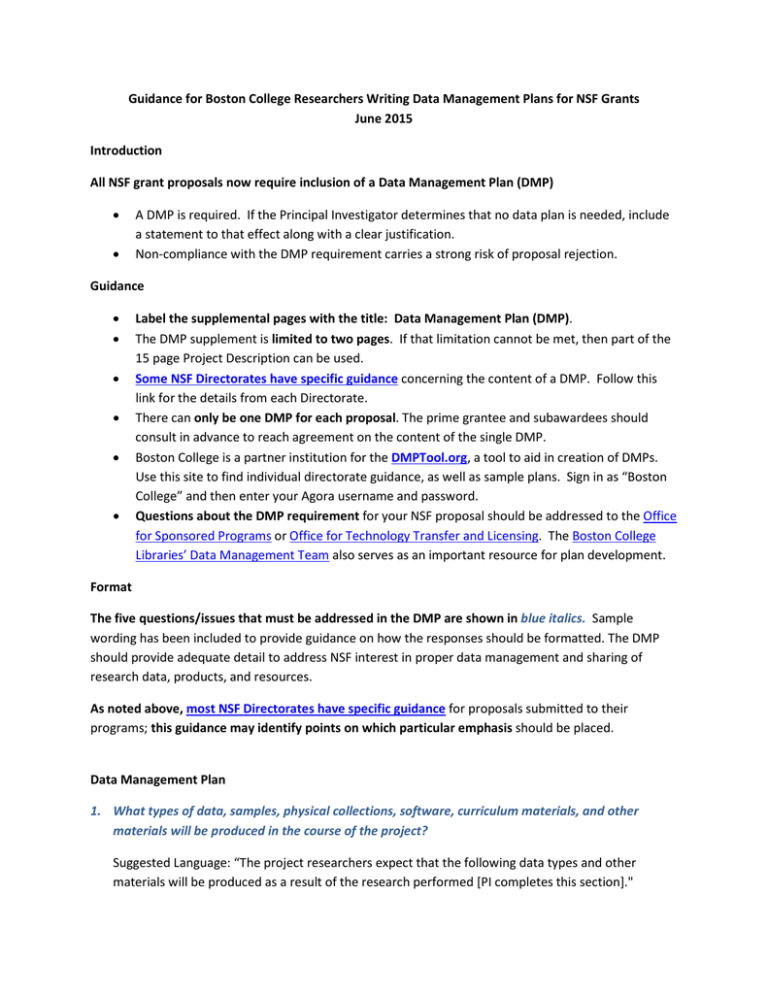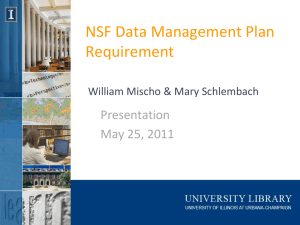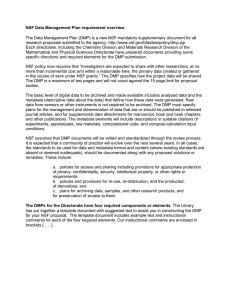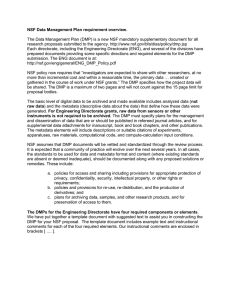Guidance for Boston College Researchers Writing Data Management Plans for... June 2015 Introduction
advertisement

Guidance for Boston College Researchers Writing Data Management Plans for NSF Grants
June 2015
Introduction
All NSF grant proposals now require inclusion of a Data Management Plan (DMP)
•
•
A DMP is required. If the Principal Investigator determines that no data plan is needed, include
a statement to that effect along with a clear justification.
Non-compliance with the DMP requirement carries a strong risk of proposal rejection.
Guidance
•
•
•
•
•
•
Label the supplemental pages with the title: Data Management Plan (DMP).
The DMP supplement is limited to two pages. If that limitation cannot be met, then part of the
15 page Project Description can be used.
Some NSF Directorates have specific guidance concerning the content of a DMP. Follow this
link for the details from each Directorate.
There can only be one DMP for each proposal. The prime grantee and subawardees should
consult in advance to reach agreement on the content of the single DMP.
Boston College is a partner institution for the DMPTool.org, a tool to aid in creation of DMPs.
Use this site to find individual directorate guidance, as well as sample plans. Sign in as “Boston
College” and then enter your Agora username and password.
Questions about the DMP requirement for your NSF proposal should be addressed to the Office
for Sponsored Programs or Office for Technology Transfer and Licensing. The Boston College
Libraries’ Data Management Team also serves as an important resource for plan development.
Format
The five questions/issues that must be addressed in the DMP are shown in blue italics. Sample
wording has been included to provide guidance on how the responses should be formatted. The DMP
should provide adequate detail to address NSF interest in proper data management and sharing of
research data, products, and resources.
As noted above, most NSF Directorates have specific guidance for proposals submitted to their
programs; this guidance may identify points on which particular emphasis should be placed.
Data Management Plan
1. What types of data, samples, physical collections, software, curriculum materials, and other
materials will be produced in the course of the project?
Suggested Language: “The project researchers expect that the following data types and other
materials will be produced as a result of the research performed [PI completes this section]."
Tips:
•
•
•
•
Describe all types of data to be collected and provide the context for why they are to be
collected.
Include information on the estimated number and size of the data sets.
Information on the quality/state of the data will also be relevant.
Software version and instrument model information should be included.
2. What data management standards will be used for data and metadata format and content? If
current standards do not exist or are inadequate, please document this along with any proposed
solutions.
• Data formats and metadata standards vary by discipline. For suggested standards, including
minimum ISO recommendations when no standards are indicated, see:
http://libguides.bc.edu/dataplan/metadatastandards
• For long-term archiving and preservation, NSF encourages the inclusion of open data formats in
addition to the original data formats whenever possible to ensure future access to research
data. Examples: .txt for text and .csv for spreadsheets.
• Contact library subject specialists for support and discipline-specific recommendations for
metadata standards and open data formats: wymanr.DMPlibraryhelp@bc.edu
3. What policies are in place for access and sharing including provisions for appropriate protection of
privacy, confidentiality, security, intellectual property, or other rights or requirements?
•
Boston College will abide by all aspects of the NSF Award and Administration Guide,
Section VI.D.4 . In addition, Boston College has a number of policies that address various
aspects of data management:
University Research and Projects Policy
Intellectual Property Policy
Access to and Retention of Data (revision in progress)
Policy for the Protection of Human Research Participants (if appropriate for the
project)
Animal Care Facility Standard Operating Procedures (if appropriate for the project)
•
The NSF mandate emphasizes open data and sharing. Deposition of data in either an
institutional and/or discipline-specific data repository can satisfy this requirement.
Examples include PubChem, GenBank or ICPSR. Some directorates specify particular
repositories; see NSF Directorate guidelines .
Suggested language: "We will make our data available for use by others by depositing it
in eScholarship, the Boston College institutional repository, and/or provide links there to
{add name of discipline-specific repository such as PubChem or GenBank where you will
be depositing data.}
•
For additional guidance:
Data Sharing: BC Libraries or contact wymanr.DMPlibraryhelp@bc.edu
General Institutional Policies on Data
Data Security: IT Assurance Department
Intellectual Property: The Office for Technology Transfer and Licensing
4. What policies and provisions are in place for re-use, re-distribution, and the production of
derivatives?
• Boston College will abide by the provisions of the NSF Award and Administration Guide,
Section VI.D.4 which addresses publication and data sharing. In response to requests to
share research materials and tools:
It is typical to use the Universal Biological Material Transfer Agreement.
We also use a revised version of that agreement for non-biological materials. Those
agreements typically cover rights to derivatives fairly and equitably.
Depending on the nature of the data or materials involved, we may use a NonDisclosure Agreement in order to protect intellectual property rights. The point of
using such agreements is to enable sharing of data and materials for the benefit of
the scientific community while protecting the legitimate intellectual property rights
belonging to Boston College and it researchers.
5.
Describe plans for archiving data, samples, and other research products as well as for the
preservation of access to them.
•
•
Boston College’s Access to and Retention of Data Policy (revision in progress) ensures that NSF
will have appropriate access to research data in accordance with the terms and conditions of the
grant.
Boston College encourages local long-term archiving and preservation of data in the Institutional
Repository, escholarship@bc. Disciplinary specific repositories may provide the best support for
scientific data and larger datasets, with a link to that data in the BC Institutional Repository for
best access.
Suggested language: "We will archive and preserve our data by depositing it in
eScholarship, The Boston College Institutional Repository, and/or provide links there to
{add name of discipline-specific repository such as PubChem or GenBank where you will
be depositing data.}
•
See http://libguides.bc.edu/dataplan/datarepositories for guidance on identifying disciplinespecific data archives/repositories for long-term archiving/preservation and on
eScholarship@BC.
Guide prepared by the Boston College Libraries Data Management Support Group (June 2015)




